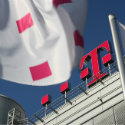
Also in today's EMEA regional roundup: UK COVID-19 app bites the dust; Amazon creates virtual jobs in South Africa; UKCloud goes carbon-negative.
Deutsche Telekom used its first virtual shareholders' meeting to confirm its growth targets, propose a €0.60 dividend and pat itself on the back for "25 years of success." Looking ahead, CEO Tim Höttges cited market leadership in 5G and being top dog in the US mobile market as defined goals, while on the fixed-line side, he declared his company would become "the the No. 1 fiber-optic company in Germany and Europe." No pressure, then.
The UK's homegrown, or at least semi-grown, COVID-19 contact-tracing app has been abandoned in its current form. The app, being tested on the Isle of Wight (just off the south coast of England) before, it was originally thought, a nationwide rollout in May, used a "centralized" approach, whereby the data it generated was stored on a central server. This contrasted with a "decentralized" platform being touted jointly by Apple and Google, and it is towards that decentralized platform that the UK app will now transition, after those nominally in charge of the original effort found that the app in its current form did not work properly on Apple iPhones (and a fair number of Android handsets for that matter). For more on the sorry affair, see this story on our sister site, Telecoms.com.
Amazon says it is creating 3,000 new "virtual" customer service jobs in South Africa this year. Those employed will be dealing with customers in North America and Europe, and will range from "where's my parcel, dude?" complaint handlers to technical experts. These additions will bring the total permanent Amazon workforce in South Africa to 7,000.
UKCloud, a provider of cloud services to the UK public sector, has extended its provision of certified "carbon-negative" services in support of the UK government's sustainable technology strategy. The company uses data centers managed by Ark, which was founded by UKCloud's chairman, Jeffrey Thomas.
Four Belgian companies – Proximus, ORES, SWDE and VOO – have joined forces to set up a system which they hope will make it possible to sort out all a household's connections in one day through a single request. Telephone, broadband, electricity, gas and water are all covered by the "Connect My Home" scheme.
The return of Premier League soccer in the UK – albeit behind closed doors – has prompted a surge in data usage on the O2 network, with the peak being reached at 8 p.m. on Wednesday, just before kick-off for the Manchester City versus Arsenal match. With lockdown keeping the fans grounded, so-called "watch parties" have become very popular, with fans remotely communing and commenting on the action being played out in empty stadiums. The city of Liverpool saw the largest spike – 21% – even though their team wasn't even playing: their fans were a-buzz with anticipation that a defeat by Manchester City would present league leaders Liverpool with the championship title.
— Paul Rainford, Assistant Editor, Europe, Light Reading
Read more about:
EuropeAbout the Author(s)
You May Also Like












